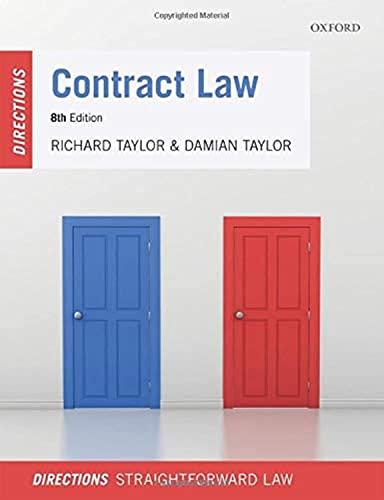Question
1.Is the risk of death from smoking a commonly known danger? It may be today, but in the fifties and sixties, the tobacco industry undertook
1.Is the risk of death from smoking a commonly known danger? It may be today, but in the fifties and sixties, the tobacco industry undertook an extraordinary campaign to convince the public that there was no harm in smoking cigarettes, and even suggested that smoking may have health benefits. Example http://tobacco.stanford.edu for a collection of some of the print advertising from this era. Should older plaintiffs who grew up viewing these advertisements be allowed to sue tobacco companies under strict product liability? Why or why not?
2. Is fast food or restaurant food an unreasonably dangerous product? Many nutritionists and doctors believe that excessive consumption of fast food and restaurant food can lead to obesity, high blood pressure, heart disease, diabetes, and other health complications including premature death. You may be surprised at exactly how bad these food products can be for you. Example http://www.youtube.com/watch?v=MtgOmChwAm4 for an example of how unhealthy eating out at Italian restaurants can be. Should these food producers therefore take steps to make their product less dangerous or to warn about the dangers of overconsumption? Should Congress pass legislation such as the Personal Responsibility in Food Consumption Act to immunize the food industry from product liability suits?
3. Stella Liebeck, an elderly grandmother, received third-degree burns when she spilled coffee purchased at a McDonald's drive-through. At trial, experts testified that McDonald's coffee was too hot to be consumed at the point of purchase, was hotter than any other restaurant's coffee or coffee brewed at home, and was so hot that third-degree burns would result within three to five seconds of coming into contact with the skin. McDonald's also conceded that the coffee was brewed extremely hot for commercial (profit) reasons, because most customers wanted coffee to be hot throughout their commute. After finding the company liable, the jury awarded Mrs. Liebeck two days' worth of coffee sales at McDonald's, an amount equivalent to $2.7 million, in punitive damages. The award, although reduced to much less than that, set off a firestorm of criticism that has not died down to this day. Do you believe that it's possible for coffee to be unreasonably dangerous? Example http://www.hotcoffeethemovie.com for one filmmaker's perspective on this case.
Step by Step Solution
There are 3 Steps involved in it
Step: 1

Get Instant Access to Expert-Tailored Solutions
See step-by-step solutions with expert insights and AI powered tools for academic success
Step: 2

Step: 3

Ace Your Homework with AI
Get the answers you need in no time with our AI-driven, step-by-step assistance
Get Started


